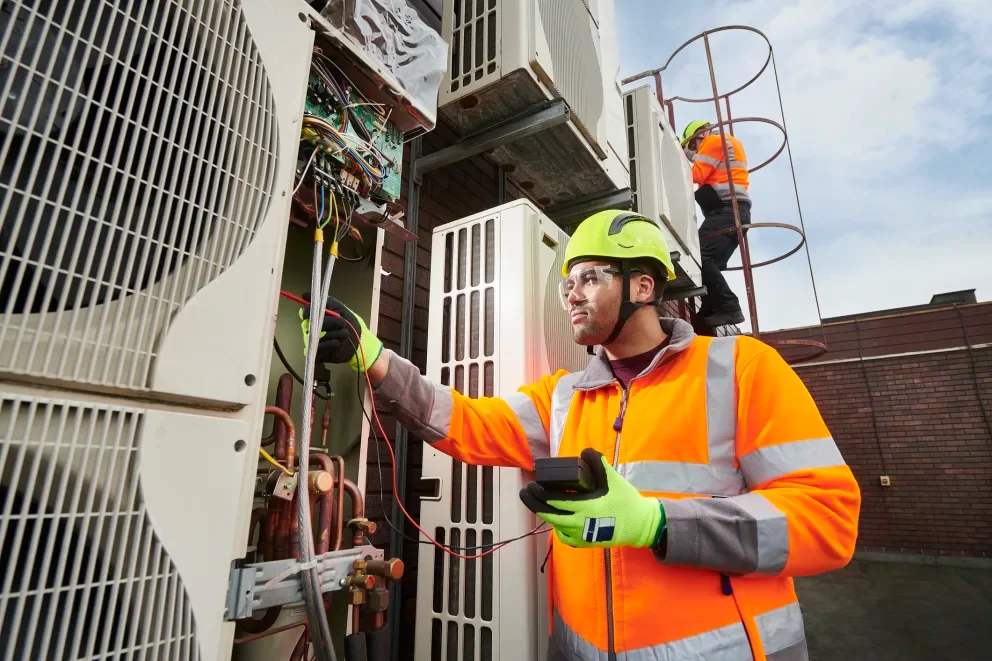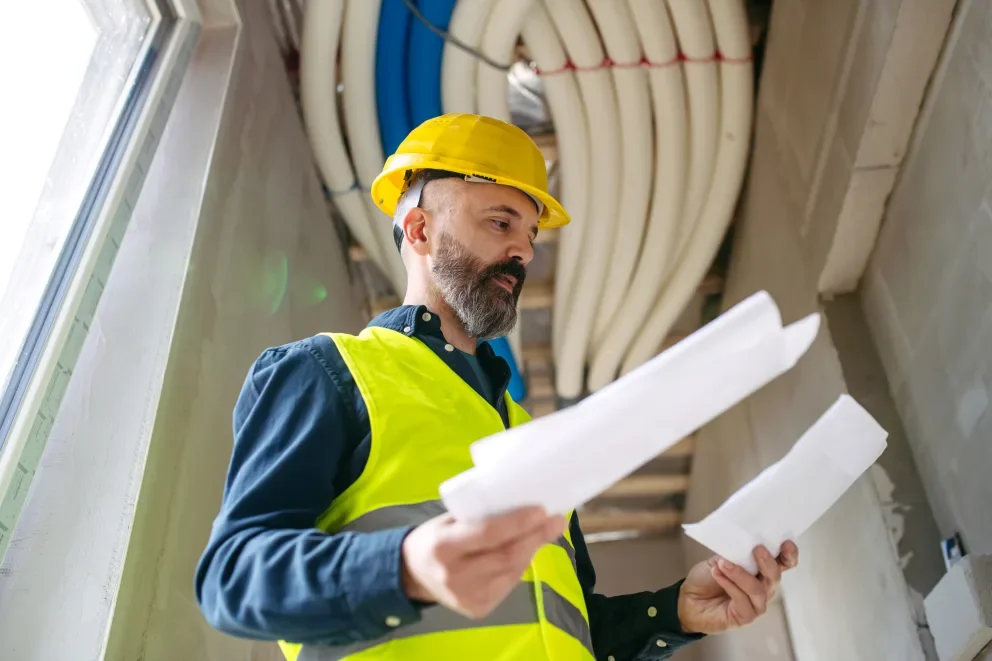HVAC Installer Vs Technician Salary. HVAC installers and technicians both play vital roles in the heating, ventilation, and air conditioning (HVAC) industry, but their responsibilities differ in significant ways. An HVAC installer focuses primarily on installing new systems in residential or commercial spaces. They interpret blueprints, assemble systems, and ensure proper installation according to specific standards and regulations.
On the other hand, an HVAC technician carries out regular maintenance, repair, and troubleshooting on existing systems. They diagnose problems, replace worn-out parts, and perform routine check-ups to ensure overall system efficiency.
These differences in job descriptions directly impact the salaries of HVAC installers and technicians. Salaries in the HVAC industry often reflect the complexity and demands of a worker’s role. While both positions require technical knowledge and physical stamina, the technician’s role involves advanced problem-solving skills and the capability to handle emergency repairs and maintenance.
Consequently, HVAC technicians often earn a higher salary compared to HVAC installers. The difference in salaries may also reflect educational and certification requirements. Technicians often need more extensive training and certifications, justifying their higher pay. However, it’s important to note that numerous factors, like geographic location, experience level, and the size of the employing company, also influence salary ranges.
How does the salary of an HVAC Technician compare to that of an Installer?
When it comes to the field of heating, ventilation, and air conditioning (HVAC), two prominent roles are those of an HVAC technician and an HVAC installer. These two positions, while closely related, bear considerable differences in their responsibilities and, consequently, their salaries.
An HVAC technician primarily deals with the servicing, maintenance, and repair of HVAC systems. They diagnose problems, suggest solutions, and carry out necessary repairs to ensure the system’s optimal working condition. On average, HVAC technicians earn a higher income than HVAC installers due to the complexity and technicality of their tasks.
On the other hand, HVAC installers are responsible for the installation and setup of HVAC systems. This role typically involves the physical installation of units, ductwork, and wiring. While HVAC installers may not always have the same depth of technical knowledge as technicians, their skills are crucial in ensuring the functionality and efficiency of HVAC systems.
In terms of salary, HVAC technicians generally earn a higher wage compared to HVAC installers. This can be attributed to the increased technical knowledge and skills required, as well the potential for more complex and challenging work scenarios. However, it’s important to note that salaries can vary significantly based on experience, qualifications, and location.
Is there a significant salary progression with experience for HVAC Technicians and Installers?
There exists a tangible salary progression for HVAC Technicians and Installers with increased experience. Individuals beginning their careers in these roles often earn a modest income, reflecting their novice status in the industry. However, as they gain hands-on experience, refine their skills, and expand their knowledge, their earning potential correspondingly increases.
For HVAC Technicians, the initial years can be demanding, both physically and mentally. Despite this, they remain vital players in maintaining and repairing HVAC systems. With time, technicians can graduate to more complex tasks, often leading to a noticeable uptick in their salary.
Similarly, HVAC Installers also witness a substantial jump in their earnings as they acquire more experience. Starting with basic installations, they eventually handle intricate projects involving large commercial systems. Their increased responsibility is mirrored in their enhanced salary.
In both positions, the salary progression is not merely a result of experience but also of additional certifications and qualifications obtained along the way. These can significantly elevate the expertise of HVAC Technicians and Installers, making them more valuable to their employers and thereby, increasing their earning potential.
While the exact numbers can vary based on the geographical location and level of expertise, the overall trend is clear. HVAC Technicians and Installers who invest in their professional development and continuously strive for excellence can expect a significant rise in their salaries over time.
What additional skills or certifications can increase the salary of HVAC Installers and Technicians?
In the HVAC industry, the compensation of installers and technicians can substantially increase with the acquisition of additional skills and certifications. For one, obtaining a North American Technician Excellence (NATE) certification, the largest non-profit certification organization for heating, ventilation, air conditioning and refrigeration technicians, is a significant advantage. This endorsement not only validates the technician’s expertise but also leads to better job opportunities and higher salaries.
Another impactful certification is the EPA Section 608 Technician Certification. This is required by the Environmental Protection Agency for anyone who handles equipment that could release ozone-depleting refrigerants into the atmosphere. Possessing this certification demonstrates an understanding of the importance of maintaining the environment, thus making a candidate more appealing.
In addition to certifications, possessing advanced technical skills can also boost an HVAC installer or technician’s salary. Mastery in understanding complex HVAC blueprints, proficiency in welding, and excellent electrical troubleshooting capabilities are skills that employers are willing to pay a premium for.
Furthermore, strong customer service skills can be a game-changer. HVAC professionals often interact directly with clients, so those who can provide excellent service may earn higher wages. Moreover, skills in sales can be beneficial since technicians often recommend new systems or upgrades to customers.
Lastly, industry experience can significantly impact a technician’s salary. As they gain more experience, HVAC professionals can take on more complex tasks, which can lead to higher earning potential.
What are the highest-paying states for HVAC Installers and Technicians?
Making a career choice between an HVAC installer and an HVAC technician often hinges on numerous factors, and potential salary is undoubtedly a major consideration. When examining the highest-paying states for these professions, some distinct patterns emerge.
For HVAC technicians, Alaska tops the list, offering a median annual wage that far surpasses the national average. Other states that pay generously include Connecticut, Hawaii, Massachusetts, and the District of Columbia.
HVAC installers, on the other hand, find the most lucrative opportunities in New Jersey, with an average salary significantly higher than most other states. Other states with noteworthy earnings for HVAC installers include Alaska, Connecticut, Hawaii, and Massachusetts.
It’s important to note, however, that these figures often reflect the cost of living in these regions. States like Hawaii and Alaska, while offering high salaries, also have a higher cost of living.
How does the industry sector (residential vs commercial) impact the salary of HVAC Technicians and Installers?
The industry sector plays a significant role in determining the salary of HVAC technicians and installers. In general, professionals working in the commercial sector tend to earn a higher income when compared to their counterparts in the residential sector.
Starting with HVAC technicians, those serving commercial clients often encounter complex systems requiring specialized skills and knowledge. This complexity necessitates additional training and experience, making these technicians more valuable, thus leading to higher compensation. On the other hand, residential HVAC technicians usually deal with less complicated systems, resulting in comparatively lower salaries.
Similarly, the scenario is quite alike for HVAC installers. Commercial HVAC installers deal with large-scale projects, working on intricate systems that heat or cool large buildings or industrial complexes. These projects not only require technical prowess but also demand a high level of project management skills. As a result, commercial HVAC installers typically command a higher salary.
In contrast, residential HVAC installers work primarily in homes, dealing with smaller, less complex systems. While this work is still crucial and requires skilled hands, it doesn’t often command the same premium as commercial work. Hence, their compensation tends to be lower compared to those in the commercial sector.
However, it’s important to note that these are general trends and individual earnings can vary widely based on factors like geographic location, level of experience, and certifications held. Therefore, while industry sector is a significant influence, it is only one of many factors impacting HVAC technician and installer salaries.
What is the job outlook and salary growth potential for HVAC Installers and Technicians?
The job outlook for both HVAC installers and technicians is promising. According to the U.S. Bureau of Labor Statistics (BLS), employment opportunities in these fields are projected to grow 4% from 2019 to 2029, about as fast as the average for all occupations. Economic growth and new building construction are the primary drivers of this demand.
In terms of salary, HVAC installers and technicians enjoy competitive compensation. The BLS reports the median annual wage for heating, air conditioning, and refrigeration mechanics and installers was $48,730 in May 2019. However, earnings can vary significantly based on experience, specialization, and the geographic location of work.
HVAC installers earn their keep installing new systems. Their salaries tend to be on the higher end due to the technical complexity of the job and the need for precision. On the other hand, technicians, who are chiefly responsible for maintaining and repairing existing systems, also earn a respectable income. Their pay is often determined by the complexity and quantity of the systems they service.
That said, salary growth potential for both HVAC installers and technicians is favorable. As professionals gain more experience and technical expertise, their earnings generally increase. Additionally, those who take further education and earn specialized certifications often find themselves at the top of the pay scale.
Key Takeaways:
– The salaries of HVAC installers and technicians are influenced by factors like skills, customer service abilities, sales skills, and industry experience.
– High-paying states for HVAC technicians include Alaska, Connecticut, Hawaii, Massachusetts, and the District of Columbia, while New Jersey, Alaska, Connecticut, Hawaii, and Massachusetts offer lucrative opportunities for HVAC installers.
– The industry sector (residential vs commercial) significantly impacts the salary of HVAC technicians and installers, with those working in the commercial sector generally earning more.
– The job outlook for both HVAC installers and technicians is promising, with a projected growth rate of 4% from 2019 to 2029.
– The median annual wage for HVAC professionals was $48,730 in May 2019, with the potential for income increase based on experience, specialization, and geographic location.



